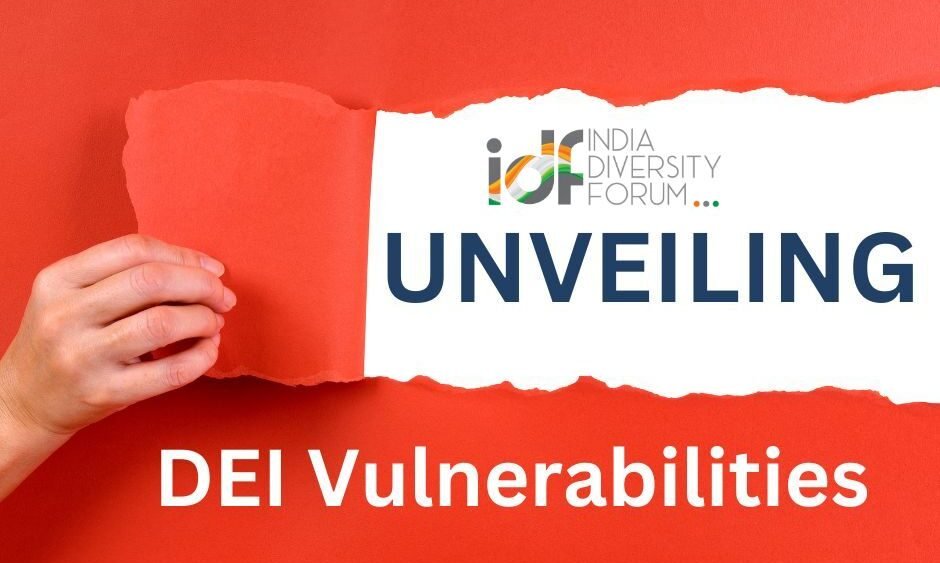India, known for its rich diversity, faces unique challenges in fostering Diversity, Equity, and Inclusion (DEI) within its organizations. While many companies acknowledge the ethical and business benefits of a diverse workforce, achieving true inclusivity remains a complex and ongoing process. This article delves into the key DEI vulnerabilities prevalent in Indian corporate culture and explores proven strategies employed by leading organizations to address them effectively.
DEI Vulnerabilities:
- Deep-Rooted Societal Norms: India’s strong cultural traditions can sometimes hinder progress on DEI. Gender stereotypes, societal biases towards caste and religion, and conformity can create barriers for individuals from diverse backgrounds. These norms can manifest in various ways. Unequal pay and promotion opportunities due to a lack of representation in leadership positions are a few examples.
- Unconscious Bias: Unconscious biases, often stemming from personal experiences and societal conditioning, can unintentionally disadvantage certain groups in the workplace. These biases can influence hiring, promotion decisions, performance evaluations, and team interactions.
- Lack of Comprehensive DEI Policies and Practices: Many Indian companies haven’t yet developed comprehensive DEI policies with clear action plans, measurable metrics, and accountability mechanisms.
- Inadequate Training and Development: Insufficient training on unconscious bias, diversity awareness, and inclusive leadership skills can hinder efforts to foster a truly inclusive environment. Employees may lack the knowledge and tools needed to identify and address biases, creating communication gaps and hindering collaboration.
- Limited Data and Metrics: The absence of robust data collection and analysis on DEI metrics can make it difficult for companies to identify current vulnerabilities, track progress, and assess the effectiveness of implemented strategies. Without reliable data, organizations are unable to establish baselines and measure the impact of their DEI initiatives.
Strategies for Addressing DEI Vulnerabilities:
- Fostering an Inclusive Culture: Building a culture of inclusion requires a commitment from leadership, with clear communication throughout the organization. This involves creating an environment where everyone feels valued, respected, and heard, regardless of their background or identity.
- Implementing Unconscious Bias Training: Regular training sessions on unconscious bias can help employees recognize and address implicit biases within themselves and the organization. By raising awareness and providing tools to mitigate bias, organizations can create a fairer and more just workplace.
- 3. Developing Comprehensive DEI Policies and Practices: Establishing clear DEI policies and practices that span recruitment, training, development, performance evaluation, and promotion processes is crucial. These policies should be routinely reviewed and updated to ensure inclusivity and effectiveness.
- Investing in Diversity and Inclusion Training: Equipping leaders and employees with the necessary skills through dedicated DEI training programs is crucial. This training should cover topics like unconscious bias, inclusive communication, and creating an accessible and welcoming environment.
- 5. Promoting Data-Driven Decision Making: Organizations should prioritize collecting and analyzing diverse data sets to identify existing gaps and track their progress on DEI initiatives. This data can then be used to inform decision-making, measure the effectiveness of implemented strategies, and adjust approaches as needed.
Success Stories: Learning from Proven Strategies:
Several Indian companies have successfully implemented innovative approaches to address their DEI vulnerabilities. Here are a few examples:
- Infosys: They launched its “Diversity Champions” program, identifying and training employees to champion DEI initiatives.
- Hindustan Unilever Limited (HUL): HUL launched the “Leverage Project,” focusing on empowering women in its supply chain.
- Accenture India: Their “Inclusion & Diversity Council” oversees their DEI strategy, focusing on initiatives like unconscious bias training and creating employee resource groups.
These examples showcase the effectiveness of implementing targeted strategies backed by leadership commitment and sustained efforts.
Addressing DEI vulnerabilities requires a multi-pronged approach. This includes fostering an inclusive culture, tackling unconscious bias, implementing comprehensive policies, and investing in data-driven decision-making. Organisations can pave the way for a more DEI future for their employees by learning from these challenges.


